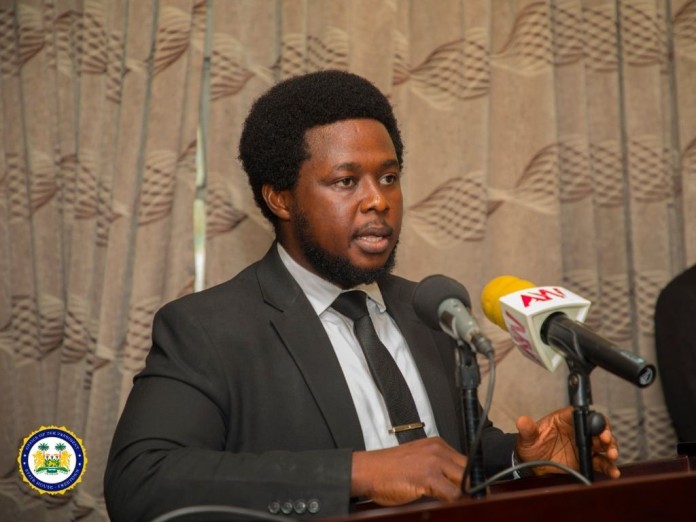By Foday Moriba Conteh
During the close of a three-day Management Retreat held at The Place Resort, Tokeh, in the Western Rural District with the theme: “Accelerating the Impact of the ACC on Development in Sierra Leone”,
the Commissioner of the Anti-Corruption Commission (ACC), Francis Ben Kaifala Esq, called on the Directors, Deputy Directors and Regional Managers of the Commission to focus on producing results in order to improve Sierra Leone’s ranking in the Transparency International (TI) Corruption Perception Index (CPI) and other similar indexes.
The ACC Commissioner said he would ensure that all Departments and Regional Offices get more autonomy for them to be able to introduce new ideas and instill discipline in the work and operations of the Commission. “Do not always wait to be told what to do! You should also focus on producing results and solutions rather than running commentaries on challenges. Make yourselves relevant, be dutiful and never shy away from your responsibility,” the ACC Commissioner furthered.
The ACC Commissioner re-echoed his statement made at the opening ceremony of the Retreat when he said “we are currently sitting at 110 in the Transparency International Index, so my aim for the next five years is for us to take the country to double digits in the Index.”
The Deputy Commissioner of the Commission Augustine, Foday Ngobie, in his closing remarks said the Commission is looking forward to an effective and professional witness management system so that members of the public would always feel encouraged to come forward to make reports to the Commission.
Mr. Ngobie also said that the Commission should look at avenues to incorporate a grievance redress mechanism component in all public projects to ensure that they benefit the people of Sierra Leone.
The Chairman of the ACC Advisory Board, Prince F. Goba, encouraged the Commission to be able to coordinate all the strategies presented during the Retreat into an action plan for effective implementation.
Earlier, the Lead Facilitator, Dr. Modupeh Taylor-Pearce, said that his objective is to ensure that the ACC becomes far better than it is now as an institution. He said disciplined leadership should be at the centre of the operations of the Commission.
The Executive Director of A Call To Business, Joe Abass Bangura, made a presentation on ‘Transformational Leadership’ and said “leaders don’t run commentaries on what is not working, but rather take action to make things work.”
During the Retreat, the Directors and Regional Managers of the various Departments and Regional Offices of the Commission made presentations on new and innovative ways for the fight against corruption in the next five years.
In another development, The Anti-Corruption Commission (ACC) has presented a Report on the Systems and Processes Review conducted at the Milton Margai Technical University (MMTU). The systems and processes review Report ,which was prepared by the Corruption Prevention Department of the Commission, provides all the findings, implications and recommendations on specific issues of concerns raised by some staff, and also the findings and recommendations on the general practices and procedures of the University.
The presentation took place on Wednesday, 12th July, 2023, at the Milton Margai Great Hall, Goderich Campus Freetown.
As enshrined in Section 7 (a) (b) of the Anti-Corruption Act 2008 as amended in 2019, review of practices and procedures of public bodies is conducted in order to discover corruption risk areas, and to proffer recommendations to eliminate such risks and strengthen the systems.
Director of the Prevention Department, ACC, Rashid Turay, thanked the Management of the University for their co-operation during the review process. He said the review of the University’s practices and procedures was done to identify areas of corruption or system failures at the University. “It was also done to examine specific allegations or concerns raised by some staff which was forwarded to the ACC for our intervention. During the review exercise, corruption was not detected, but weaknesses in the governance and administrative structure surfaced,” he said.
Mr Turay further noted that after the presentation of the Report, the Prevention Department would continue to work with the MMTU to implement the recommendations proffered to them to close the identified systemic gaps in the institution. He urged them to start implementing the recommendations as soon as possible to avoid sanctions from the Commission.
It could be recalled that some time ago, the Commission had received a series of allegations, such as; illegal dismissal, nepotism and tribalism, siphoning of salaries, sexual harassment, among others- against the leadership of the University.
The Commission therefore intervened to ascertain the veracity of the allegations.
Deputy Director of the Prevention Department, Samuel Marrah Esq., during the presentation of the Report, gave a summary of the findings, which border mainly on the governance structure and poor management of the institution.
Head of the ACC’s Monitoring and Compliance Unit, Ibrahim Kamara-Kay, encouraged the full participation of the institution’s Management in implementing the recommendations presented to them by the ACC, and called for the strengthening of the Integrity Management Committee to monitor the implementation process.
He admonished them to liaise with other public offices that have similar recommendations, as they would be graded on every recommendation implemented.
Chancellor of the MMTU, Dr. Victor E.A Kabia on his part commended the ACC for the review exercise and assured the Commission of their unwavering support to the fight against corruption. “We will read the Report and implement the recommendations, as they are all geared towards promoting transparency and accountability in the institution,” he said.
The Milton Margai Technical University is one of the renowned higher institutions of learning in Sierra Leone.
It was a Polytechnic institution until 2021 when it was upgraded to a University by the Government.
The University operates three campuses, one at Congo Cross, the other Brookfields, and Goderich, which hosts most of the senior management and support services staff.




